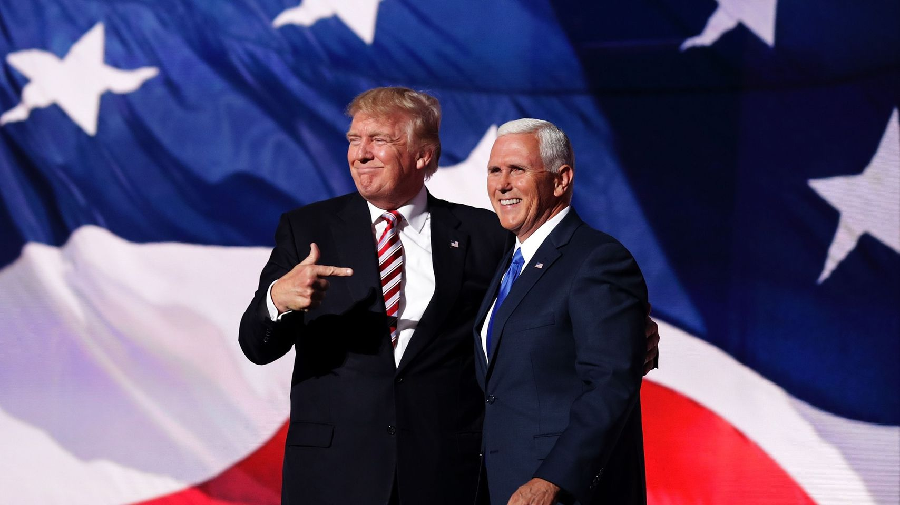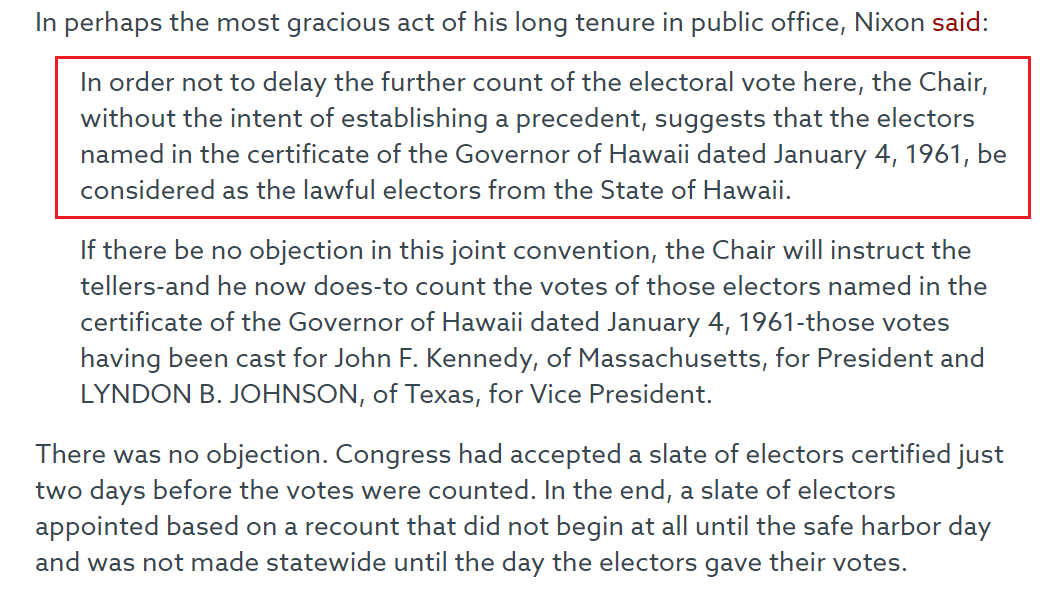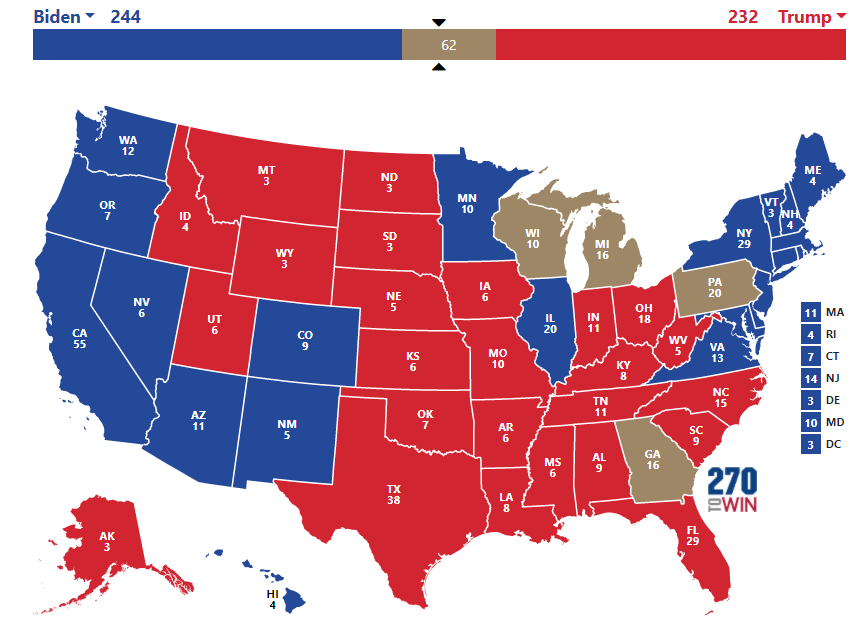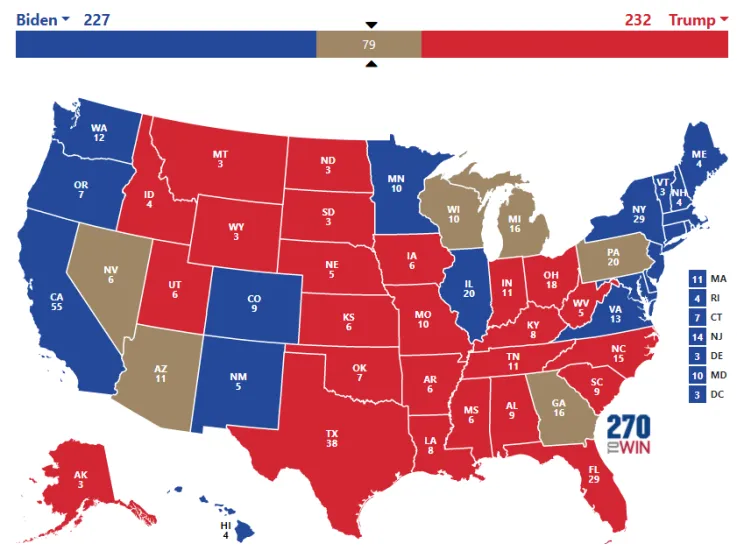Will Trump Play the Pence Card?
A thread explaining the simplest, most direct, constitutional path to 4 more years for President Trump.
A thread explaining the simplest, most direct, constitutional path to 4 more years for President Trump.
There are many opinions on if and how President Trump might pull off a win when the electoral college votes are read in the joint session of Congress on January 3rd.
Differences of opinion on whether Trump can be re-elected and what path is most likely to accomplish that goal are based on which documents are accepted as authoritative and which legal precedents are used.
I would argue that the likely behavior of certain individuals and groups has not been given enough consideration.
The predictable behavior of some people would seem to make certain paths less likely to succeed than others.
The predictable behavior of some people would seem to make certain paths less likely to succeed than others.
Some hope that a court will issue a favorable judgment that decertifies the electoral votes of certain states or overturns election results. While these efforts should continue, judges seem unwilling to get involved. I doubt the courts will play a major role in the outcome.
Some are hoping that state legislators will act in a way that reverses the actions of governors who certified electors following illegal or fraudulent elections.
There is evidence of election fraud in some states.
Some states clearly violated state or federal law (or the constitution) in the way they administered their elections. But it is unknown if state legislators will act in time to rescind the electors that have already been chosen.
Some states clearly violated state or federal law (or the constitution) in the way they administered their elections. But it is unknown if state legislators will act in time to rescind the electors that have already been chosen.
Some believe the best opportunity is to have a member of the House and a member of the Senate object to the electors of some states on January 6th, when the vote is counted. The electoral count act makes provision for this possibility.
Once an objection to a state's electoral vote is made and seconded, the House and Senate separately debate the objection and vote to either sustain or overrule it. In the Senate, nearly every member must vote in favor of the objection if it is to be sustained.
Sustaining an objection in the Senate seems unlikely given the fact that RINOs like Mitt Romney, Marco Rubio and their ilk will be asked to take a highly controversial step in supporting Donald Trump.
As hard as it will be in the Senate to get the votes to sustain an objection to an elector, it will be nearly impossible in the House due to the Democrat party's majority.
While I think that encouraging Senators and Representatives to object to electors is a goal worth pursuing, I'm not convinced that approach will succeed.
Any of the above tactics could be successful but I think the odds of any of them succeeding are small. This thread is about picking the scenario that is the most likely to succeed.
Donald Trump knows that these people are unreliable.
Do you think he would trust his Presidency and the fate of the nation to the actions of unreliable people?
I think not.
I think, if he were able, he would maintain control of the process to the greatest degree possible.
Do you think he would trust his Presidency and the fate of the nation to the actions of unreliable people?
I think not.
I think, if he were able, he would maintain control of the process to the greatest degree possible.
A precedent was set in the 1960 Presidential election between John Kennedy and Richard Nixon. In a close race, Nixon was declared the winner. To meet the "safe harbor" deadline of Dec 13th, Hawaii's Governor signed a certificate of ascertainment for Nixon's electors.
Hawaii's popular vote was disputed and a judge ordered a recount. On the day when electors had to cast their votes (Dec 19th), Kennedy had taken the lead but the final tally was weeks away. So, electors for both Nixon and Kennedy met in the capitol and cast their votes that day.
On December 28th, the recount was finished and Kennedy was declared the winner. The governor sent a revised certificate of ascertainment dated January 4th, 1961, just two days before Congress met to count the votes. https://takecareblog.com/blog/how-to-decide-a-very-close-election-for-presidential-electors-part-2
The electoral count act (3 U.S. Code § 15) provides confusing & contradictory instructions on how to determine which of two slates of electors should be accepted. Depending on how you interpret these instructions, several options are available.
Richard Nixon presided over the count in Congress that year. He made a unilateral decision and disqualified his own elector's votes, submitting only the votes for Kennedy (despite the fact that his electors were the only ones with a certificate that met the safe-harbor deadline).
Nixon said he did not intend to establish a precedent with his decision, nevertheless, he did establish one. He demonstrated the authority that can be exercised by the officer who presides over a joint session of Congress.
Some argue that the Vice-President has limited authority over the vote-counting process, but as the presiding officer over a joint session of Congress, the Vice-President has the power to make discretionary decisions regarding procedural rules as demonstrated by Nixon.
This year, Mike Pence will preside over the vote count on January 6th. Because a number of states have violated the law in the manner in which they conducted their elections, the electors (both those for Biden and those for Trump) could be rejected by Pence.
For example, Pence could reject the votes of all electors from Wisconsin, Michigan, Georgia, and Pennsylvania on the grounds that these four states expanded vote by mail in contravention of state and federal law.
The rejection of 4 states would leave both candidates short of 270 electoral votes. There is no rule indicating that the total of 538 possible electoral votes changes if some votes are disqualified. One could argue that both candidates would still need 270 votes.
If Pence disqualified these four states and if he determined that the 270 vote requirement was not met, a continent election is triggered per the 12th amendment.
In a contingent election, the House of Representatives would immediately take a vote to decide the next President. The vote in the House is one vote per state delegation. In January, Republicans will have a 26-21 state delegation majority over Dems with three states tied.
The Senate would vote to decide the next Vice-President. Republicans have a 50-46 majority with 2 seats controlled by other parties & 2 seats in Georgia on the ballot Jan 5th, the day before the votes are counted.
In the contingent election, Trump would be re-elected if the House vote along party lines. In the Senate, if Republicans maintain their majority and vote along party lines, Pence would be re-elected.
This scenario puts the outcome in control of Pence & Trump to the greatest degree possible, while minimizing the roles played by unpredictable people. It's constitutionally sound and there is historical precedent to support it.
If I was POTUS, this is the path I would plan for.
If I was POTUS, this is the path I would plan for.
Understandably, there are concerns over what RINOs are likely to do. For that reason, I think it's safest to avoid asking them to do anything that requires taking a risk.
The risk to RINOs is eliminated if Pence disqualifies electors from several states and triggers a continent election. In that case, they would simply go along with the process Pence chose. They vote by party line and blame Pence for the process and the outcome.
Democrats would throw a hissy fit if anything like this happened. The only remedy available to them would be a lawsuit contesting the process. We've already seen how little interest the Supreme Court has in election-related cases. Dems would have to live with it.
Yes, there would likely be civil unrest if something like this happened. No matter which candidate wins, there are going to be a lot of unhappy people. Trump could mobilize the national guard to quell rioting.
I think all efforts should continue to get state legislators to rescind illegitimate electors. Attorneys should continue to ask the courts for constitutional remedies. Members of Congress should be pressured to oppose electors from states that violated the law.
The purpose of this thread is to suggest that a plan may be in the works that has not yet been made public by POTUS—a plan that allows him to control much of the process.
Addendum:
The process outlined above requires RINOs to vote for Trump in a contingent election.
There is a path that removes them from the process altogether.
The process outlined above requires RINOs to vote for Trump in a contingent election.
There is a path that removes them from the process altogether.
Instead of rejecting the electoral votes of four states, Pence could reject the votes from six states—Nevada, Arizona, Pennsylvania, Georgia, Michigan, and Wisconsin.
If he did, the resulting electoral vote count would be 227 votes for Joe Biden and 232 for Donald Trump.
Since there is no provision in the Electoral Count Act (or any other law) stating that the number of votes needed to win (270) must be reduced if some votes are rejected, Pence could declare Trump the winner by a simple majority of the votes that were counted.
A cleaner version of this thread is available here. (Click through Twitter's warning.) https://prayingmedic.com/2020/12/23/will-trump-play-the-pence-card/

 Read on Twitter
Read on Twitter





